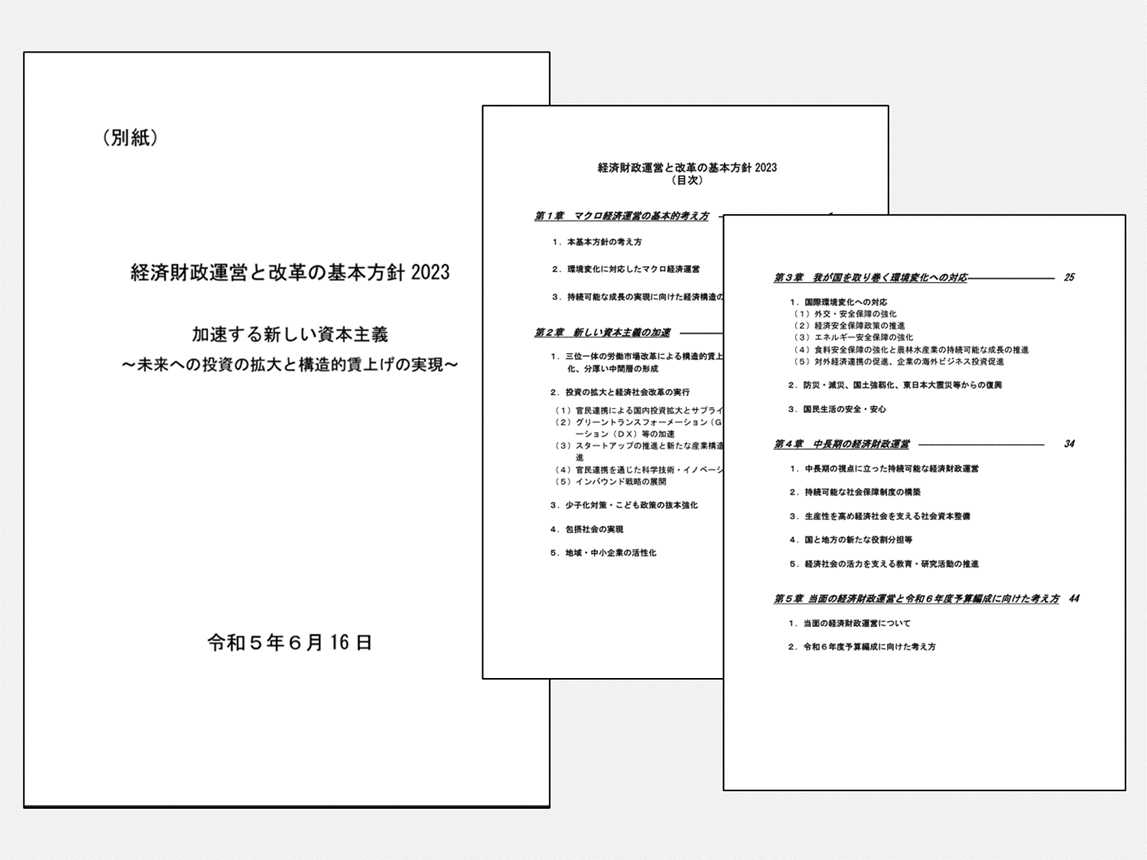[Event Report] The 50th Special Breakfast Meeting –Based on the Basic Policies for Economic and Fiscal Management and Reform (honebuto no hōshin) 2023—The Future of Health Care in Japan (June 20, 2023)
date : 8/24/2023
![[Event Report] The 50th Special Breakfast Meeting –Based on the Basic Policies for Economic and Fiscal Management and Reform (honebuto no hōshin) 2023—The Future of Health Care in Japan (June 20, 2023)](https://hgpi.org/en/wp-content/uploads/sites/2/sbm-50-1-1F7A7323.jpg)
For the 50th Special Breakfast Meeting, we had the honor of hosting Mr. Hiroaki Tabata, a member of the House of Representatives and Director of the Liberal Democratic Party (LDP) Health, Labour and Welfare Division since August 2022. His lecture focused on the future of healthcare in Japan based on the Basic Policy on Economic and Fiscal Management and Reform 2023.
Key points of the lecture
- Trinity Labor Market Reform will be essential to complete labor market reforms, but there are significant obstacles to introducing them all at once in every industry and place of business. Instead, they must be introduced step-by-step in a combined manner that is tailored to each organization.
- The triple compensation revisions for long-term care, medical care, and welfare services for people with disabilities scheduled for FY2024, the legal revisions accompanying those revisions, and budgeting to secure financial resources for those revisions will be extremely important for building a sustainable social security system.
- Broad and frequent revisions to drug prices contribute to a weaker financial base for pharmaceutical companies and other companies. To reinforce drug discovery capabilities, it will be important to implement suitable assessments and for those assessments to also include patent periods. To ensure stable supplies of generic drugs, refinements to the structure of the industry must be made so it can develop and evolve.
■Overview of the Basic Policy on Economic and Fiscal Management and Reform 2023

The “Basic Policy on Economic and Fiscal Management and Reform 2023 – Accelerating New Capitalism by Expanding Investments in the Future and Achieving Structural Wage Increases” (hereinafter “the Basic Policy”) was approved by Cabinet Decision on June 16, 2023. It was approved alongside the “Grand Design and Action Plan for a New Form of Capitalism” and the “Regulatory Reform Implementation Plan.” The Basic Policy compiles key policies and sets the direction for the Government’s overall budgeting policy in the coming fiscal year. Discussions will be deepened based on what is included in the Basic Policy by the time budget estimate requests are issued at the end of August.
Discussions on the Basic Policy simmered to a conclusion as the Kishida administration entered its third year, and the final document reached 45 pages – nine more than last year. It consists of five chapters:
- The basic approach to macroeconomic management
- Accelerating a new form of capitalism
- Responding to changes in the environment surrounding Japan
- Medium- and long-term economic and fiscal management
- Economic and fiscal management in the near future and ideas for compiling the FY2024 budget
This presentation will summarize Chapters 2 and 4 with a particular focus on the state of healthcare.
■Chapter 2: Accelerating a New Form of Capitalism – Trinity Labor Market Reform
I have held an interest in employment and labor policy throughout the course of my activities, and I feel a great sense of danger toward the facts that average wages for people in Japan have remained flat over the past three decades, and that wage growth in Japan has been slower than in Western countries. Unlike the early Heisei era, factors like the zero interest rate policy and rising insurance premiums and social security costs mean that disposable incomes are decreasing for the public, and this will require labor market reform. Trinity Labor Market Reform will be essential, but in practical terms, there are high hurdles to creating a free labor market for all industries and businesses of all sizes as well as to introducing job-based human resource management. It will be important to implement such reforms in phases, starting with fields that can adapt. Moving forward, we will establish legal frameworks to accompany these reforms and work to expand them. Given this context, the following three actions will be especially important for future reforms.
- Support capacity building through re-skilling
People in Japan tend to believe that they are done learning once they graduate university. We must expand a sense of value in which people appreciate updating themselves through continued learning and the joy of putting new knowledge to practical use. - Introduce a job-based compensation system that is tailored to the actual conditions at each company
It is important that employees are evaluated based on their abilities and not on their age, and for systems that objectively reflect evaluations in compensation to be disseminated to medium-sized enterprises. - Facilitate labor migration to growth sectors
Growth is being achieved at small- and medium-sized companies, which attract many mid-career workers with diverse backgrounds.
■Chapter 4: Medium- and Long-term Economic and Fiscal Management – Building a Sustainable Social Security System
General remarks on challenges facing healthcare and long-term care
The “Bill for the Establishment of the Institute for Health Security” – also known as the “Japanese CDC Bill” – was adopted during the current session of the Diet. It will merge the National Institute of Infectious Diseases and the National Center for Global Health and Medical Research into the “National Institute for Health Security.” Moving forward, we must establish budgetary measures and systems so this can be accomplished.
Other issues that must be addressed include restarting progress on Regional Medical Care Visions, which came to a halt due to the COVID-19 pandemic; as well as meeting demand for support for children and for perinatal care, which is facing trouble due to a decreasing number of healthcare institutions where babies can be delivered. As for the emergency medical system, in 2022, there was a significant increase in both emergency ambulances dispatched and people transported. There were 7,229,838 emergency ambulances dispatched, which was an increase of 1,036,257 dispatches or 16.7% over the previous year. The number of people transported was 6,216,909 people, which was an increase of 725,165 people or 13.2% over the previous year. These were the largest increases on record, and the burden of emergency care continues to grow. The Fire and Disaster Management Agency is taking measures to encourage people to make use of the Emergency Medical Service Center Project (#7119).
In Healthcare Digital Transformation (DX), there were errors when linking personal information to My Number cards during the online eligibility verification process, causing public trust in the My Number card system to waver. This was concerning and regrettable. Although the system was designed to prevent the possibility of human error, in the end, human errors did occur, and action must be taken to resolve them. While it was clearly stated that paper national health insurance cards will be abolished by fall 2024, citizens have various backgrounds and circumstances, and it will be more realistic to transition away from paper cards in phases. To extend healthy life expectancies, efforts to promote better health, prevent health problems, and prevent the severe exacerbation of existing health concerns must be strengthened; digital health must be connected to Healthcare DX; and, looking ahead to the third phase Data Health Plan, more energy must be devoted to analysis, including analysis that uses data as evidence.
On the topic of dentistry, the plan also emphasizes the importance of oral health, mentioning the growing recognition that the health of one’s teeth is linked to their overall health. As for cancer medicine, a Diet members’ bill for genomic cancer medicine was approved during the current Diet session and expectations are high for the field of genomic cancer medicine and the further expansion in cancer treatment. Many Diet members pointed out the need for measures for health concerns such as auditory disorders, intractable diseases, transplantation medicine, chronic kidney diseases, allergies, mental health, and nutrition, and I led many consultations and discussions in my capacity as Director of the Health, Labour and Welfare Division.
Reinforcing drug discovery capabilities
Drug prices are revised once every two years and these revisions have been growing in scope. This may be a factor causing financial pressure for pharmaceutical companies and companies related to pharmaceuticals and healthcare. Another significant issue is related to price maintenance during patent periods. Specifically, the mention of “further measures for NHI drug prices, including the appropriate evaluation of innovations at the time insurance coverage is granted” has become a source of division. There was also clear mention that drug lag and drug loss will be addressed, and that a response divided into short-, medium- and long-term issues will be mounted to fully reduce the number of unapproved drugs.
The Basic Policy says, “With the entire Government serving as a command tower, a comprehensive strategy will be formulated to promote investment in new modalities and drive international expansion.” The LDP Research Commission on Social Security System has already formed a project team for reinforcing and nurturing drug discovery capabilities which has recommended that the entire Government establish command tower functions for international expansion in this field. Rather than acting alone, it would be ideal for the Ministry of Health, Labour and Welfare (MHLW) to involve the Prime Minister’s Office and establish command tower functions outside of the MHLW and throughout the entire Government, as well as to collaborate on and orchestrate a vast movement for international expansion. The structure of copayments for products like long-listed drugs will be reviewed and examined to promote innovation within health insurance financing. Instead of expanding patient-selected extra medical services within the field of pharmaceuticals, all that was mentioned in the Basic Policy was, “Review and examine the structure of copayments.” This was likely done because “long-listed drugs” include a broad variety of drugs with different characteristics.
There are plans to amend laws related to the use of cannabis-derived medicines during the next extraordinary Diet session. The Basic Policy also mentions promoting over-the-counter (OTC) pharmaceuticals, self-medication, and the use of biosimilars, which carries implications for the promotion of imports and the reinforcement of domestic manufacturing. Efforts must be made to accelerate the approval process, although there are significant hurdles like reinforcing the system for regulatory approval to support the practical use of programmed medical devices. As the number of young people who can donate blood will continue to decrease due to population decline, from a medium- to long-term perspective, we must maintain a sense of caution regarding blood products. While promoting understanding toward blood donation, we must take various measures including those for domestic self-sufficiency, stable procurement, and encouraging the proper use of blood products.
Expenditures for and job placement in the healthcare and long-term care sectors
Chapter 4 of the Basic Policy states, “The next simultaneous revision of fees for healthcare, long-term care, and welfare services for persons with disabilities (the “Triple Revision”) will take into consideration rising prices, increasing wages, business conditions, the need to secure human resources in face of a shrinking workforce, and the impact of the financial burdens of patient and user copayments and insurance premiums and include the necessary measures to ensure patients and users can receive necessary services.” The Triple Revision in FY2024 is likely to include a revision of long-term care service fees as well as partial legal revisions. The challenge will be restoring financial resources for Long-Term Care Insurance in communities to sound health to respond to issues like increases in the numbers of citizens ages 75 years and over and senior citizens living with dementia. Since the existing Long-Term Care Insurance service fee system does not provide financial rewards for improvements in beneficiaries’ care levels (which range from one to five and depend on long-term care need), it is likely that many long-term care providers are continuing to provide care that corresponds to higher levels or are prioritizing people who require higher levels of care. It will be necessary to flesh out incentives for improvements made to long-term care levels. Also, after four to five years of broad-ranging discussions, a bill introduced by a Diet member called the Dementia Basic Act for an Inclusive Society (or the Dementia Basic Act) has been enacted. Among other advancements, building a long-term care support system based on the Dementia Basic Act will help create an environment in which many people can enjoy greater peace of mind when receiving long-term care and that will prevent people from being cut off from long-term care and becoming “long-term care refugees.”
Other emerging issues include personnel shortages among paramedics and long-term care providers, excessive referral fees charged by private for-profit long-term care companies, and high penalties fees for contract cancellations made after cooling-off periods. Public employment agencies like Hello Work must function more effectively and their robust activities must be made more visible. This is also an item that many legislators have voiced opinions on.
Steering fiscal management in a new direction
The direction of the Government’s fiscal management is set for one financial frame on a three-year cycle, so the current fiscal management approach follows that of the Basic Policy on Economic and Fiscal Management and Reform 2021. In 2021, growth in social security-related expenses was limited to the corresponding increase due to population aging. In a similar manner, the approach to budgeting was to reduce other budgets to secure financial resources to outpace population aging. The most frequently-selected target for reduction was pharmaceutical expenditures, which were reduced by as much as 160 billion yen. It was necessary to reverse this approach and I lobbied hard alongside many like-minded Diet members to see that happen. Although it was not mentioned in the Basic Policy, we were able to hold a fair and open discussion on this topic with the Deputy Director-General of the financial bureau, so it is likely to be reexamined during the budget compilation in December. As for additions to official prices during the Triple Revision, the budgeting policy ended up being different than last year.
Unnecessary expenditures must be curbed to generate finances to cover increases in social security spending. While maintaining an awareness toward willingness to invest and work in healthcare, long-term care, and drug discovery, we will send out political messages and advance the necessary discussions.
The need for measures to address inflation and rising prices
Recently, Japan has reversed from deflation to inflation, and we have now entered a phase in which prices are trending upward. The Kishida administration has requested the private sector to increase wages, and the Japan Business Federation has reported base salary wage increases of 3% or more in the spring labor offensive, centered around large corporations. On the other hand, those working at companies that are subject to official prices will end up being left out, so if the Government wants higher private sector wages, official prices must also be raised accordingly.
For dependents, there are what is known as “income barriers,” where real income decreases due to social security premiums that apply once their annual income exceeds 1.03 million yen and 1.3 million yen. Exceeding these barriers impacts employee pensions and other benefits, so this is a topic that requires cool-headed discussion, and the Government has declared it will work to review this system.
Increases in energy and electricity prices are particularly high at healthcare institutions and pharmaceutical companies, and this has become a source of pressure on their business operations. While it should be profits that drive wage increases through market mechanisms, diminishing returns mean companies currently have no choice but to use profits to stay in business, and this an alarming problem.
Generic drugs
Many people serving in real-world medical settings and dispensing pharmacies have voiced their concern regarding stable supplies of generic drugs. An expert panel at the MHLW has also offered recommendations on this issue, but there are structural problems like the ones below.
- The drug pricing system does not reflect prevailing market prices
- There is excessive price competition
- Negotiations with pharmacies and healthcare institutions are resulting in lower prices
- There are companies that lack the capacity for joint development and manufacturing
From the perspective of health financing, transitioning to an industrial structure that can maintain a stable supply of a broad range of generic drugs will be vital. This will require the following measures.
- Correct joint development mechanisms
- To further improve manufacturing capacity, consider evaluations that are tailored to it
- Starting with drugs of high medical necessity, assign price tiers to be reflected in the drug pricing system
- Strengthen the entire pharmaceutical supply chain
Antimicrobials have also been designated as key commodities, so proactive measures should also be taken for pharmaceuticals from an economic security perspective.
A lively exchange of opinions was held with members of the audience during the Q&A session after the lecture. Topics discussed included how to best structure the Government’s financial resources and challenges for retention rates in preventive healthcare.
(Photographed by: Kazunori Izawa)
■Profile
Mr. Hiroaki Tabata (Member, House of Representatives; Director, Health, Labour and Welfare Division, Liberal Democratic Party)
Mr. Tabata has served as Director of the House of Representatives Committee on Health, Labour and Welfare, State Minister for Internal Affairs and Communications, and Parliamentary Vice-Minister of the Minister of Health, Labour and Welfare, and as Director of the Health, Labor and Welfare Division of the Liberal Democratic Party since August 2022, he has been actively involved in policymaking in the ruling party, especially in the fields of health care and pharmaceuticals. Based on the lessons learned from COVID-19, Mr. Tabata will discuss the National Health Emergency Management Research Organization, the so-called Japanese version of the CDC, the rapid and stable supply of pharmaceuticals, and the domestic drug discovery ecosystem, as well as his thoughts on the prospects and the future of Japan from a broad perspective. He will also be discussing these perspectives with everyone in attendance.
Top Research & Recommendations Posts
- [Research Report] Perceptions, Knowledge, Actions and Perspectives of Healthcare Organizations in Japan in Relation to Climate Change and Health: A Cross-Sectional Study (November 13, 2025)
- [Policy Recommendations] Mental Health Project: Recommendations on Three Issues in the Area of Mental Health (July 4, 2025)
- [Research Report] The 2025 Public Opinion Survey on Healthcare in Japan (March 17, 2025)
- [Research Report] The 2023 Public Opinion Survey on Satisfaction in Healthcare in Japan and Healthcare Applications of Generative AI (January 11, 2024)
- [Policy Recommendations] Developing a National Health and Climate Strategy for Japan (June 26, 2024)
- [Policy Recommendations] Recommendations on Strategic Investments in Policies for Brain Health to Revitalize Japan: Hopes for the New Administration (December 1, 2025)
- [Policy Recommendations] Reshaping Japan’s Immunization Policy for Life Course Coverage and Vaccine Equity: Challenges and Prospects for an Era of Prevention and Health Promotion (April 25, 2025)
- [Announcement] HGPI Endorses the “Belém Health Action Plan” (November 14, 2025)
- [Announcement] HGPI Joins Global Green and Healthy Hospitals (August 1, 2023)
- [Research Report] AMR Policy Update #2: WHO’s First Report on Fungal Infection—Bridging the Gap Between Clinical Practice and R&D
Featured Posts
-
2025-12-09
[Event Report] Special Seminar “Rising to New Challenges in Health Sciences for Future Society: Novel Developments in the Field of Epilepsy in Japan and Globally” Belgium Pavilion Special Seminar, World Expo 2025 Osaka, Kansai (September 18, 2025)
![[Event Report] Special Seminar “Rising to New Challenges in Health Sciences for Future Society: Novel Developments in the Field of Epilepsy in Japan and Globally” Belgium Pavilion Special Seminar, World Expo 2025 Osaka, Kansai (September 18, 2025)](https://hgpi.org/en/wp-content/uploads/sites/2/HGPI_20250805_mental-health-expo-eyechatch.png)
-
2025-12-11
[Event Report] Core Components of Universal Health Coverage (UHC): Achieving “Healthcare Without Financial Hardship” in Asia-Pacific and Japan (December 5, 2025)
![[Event Report] Core Components of Universal Health Coverage (UHC): Achieving “Healthcare Without Financial Hardship” in Asia-Pacific and Japan (December 5, 2025)](https://hgpi.org/en/wp-content/uploads/sites/2/HGPI_20251210_Core-Components-of-Universal-Health-CoverageUHC-top.jpg)
-
2025-12-12
[Registration Open] Meaningful Involvement Promotion Project Urgent Symposium “The New Takaichi Administration and Central Social Insurance Medical Council Reform – Ensuring Patients’ Voices are Heard” (January 22, 2026)
![[Registration Open] Meaningful Involvement Promotion Project Urgent Symposium “The New Takaichi Administration and Central Social Insurance Medical Council Reform – Ensuring Patients’ Voices are Heard” (January 22, 2026)](https://hgpi.org/en/wp-content/uploads/sites/2/HGPI_20251208_urgent-symposium-1.png)
-
2025-12-12
[Registration Open] (Webinar) The 140th HGPI Seminar “Early Detection to Reduce COPD Disease Burden: Connecting Clinical Frontiers with Health Policy” (January 27, 2026)
![[Registration Open] (Webinar) The 140th HGPI Seminar “Early Detection to Reduce COPD Disease Burden: Connecting Clinical Frontiers with Health Policy” (January 27, 2026)](https://hgpi.org/en/wp-content/uploads/sites/2/hs140-top.png)
-
2025-12-16
[Discussion Points] Policy Dialogue “Considering Comprehensive Genomic Profiling from the Perspective of Patient Access: Utilizing the Medical Service Fee Reimbursement System and the Mixed Medical Services Program to Meet the Needs of Today” (November 28, 2025)
![[Discussion Points] Policy Dialogue “Considering Comprehensive Genomic Profiling from the Perspective of Patient Access: Utilizing the Medical Service Fee Reimbursement System and the Mixed Medical Services Program to Meet the Needs of Today” (November 28, 2025)](https://hgpi.org/en/wp-content/uploads/sites/2/eyecatch_Policy-Dialogue_Discussion-Points_20251128.jpg)







